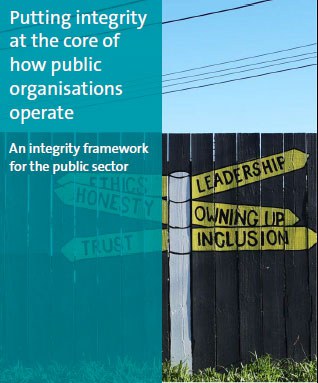Ethical leadership
Why it matters: Improves the ethical behaviour and well-being of individuals and the collective
Ethical leadership throughout the workplace has been found to enhance performance and ethical behaviour.25
It’s the 21st century… and ethical and authentic leadership really matter. We have the public expecting us to improve our behaviour and relationships.
Francis D (2019), External Independent Review into Bullying and Harassment in the New Zealand
Parliamentary Workplace
Adopting ethical leadership supports people making discretionary judgements based on values. This empowers staff and gives them the confidence to deal with situations that the "rulebook" does not specifically cover. It also enables staff to deal with situations on a case-by-case basis.26
What it looks like: Visible practising and role-modelling of ethical behaviour
Ethical leadership means that the person exercising that leadership is well grounded in a set of values and beliefs that are seen as ethical.27 This is important not just at the senior leadership level but for all individuals with leadership roles in a workplace.
It starts with how I behave, if I want my team to live the values then I need to.”
Government department manager
Ethical leaders are committed to their organisation's vision and values, and their behaviours and decision-making reflect this. For public service leaders, this also requires a demonstrated commitment to the principles and values of the public service.28
Leaders need to build a reputation for ethical leadership through role modelling. Leaders communicate explicitly (what they say) and implicitly (in what they do and how they affect others).
A failure to actively set the right tone can undermine all attempts to form a workplace culture of integrity.
Research has also found that leaders tend to overestimate their own ethical judgement and abilities, compared to the perceptions of their staff.29 Being an ethical leader involves building meaningful relationships that are based on mutual trust, empathy, respect, support, and care. Without such relationships, leaders have limited ability to influence other people's ethical behaviours.
Much of the literature focuses on how ethical leaders base their decision-making on such values as integrity, honesty, and fairness.30 Research on Māori leadership identifies the importance of expressing rangatiratanga from a position of personal integrity, humility, and authority.31
Ethical leadership requires persistence to "do the right thing" despite any challenges faced. Senior leaders are highly influential when it comes to shaping organisational behaviours. If ethical leadership is not visible at the top, it is unlikely to be found in the organisation.32
In larger organisations, most staff do not have strong working relationships with senior leaders. People leaders and middle managers are as likely, or arguably even more likely, to shape staff members' behaviour as the chief executive and are crucial to setting a positive culture. Therefore, it is important to pay attention to how an organisation's people leaders, from frontline supervisors to the senior executive team, demonstrate ethical leadership.33
It is also important to recognise and support the role informal leaders play in a workplace in creating a positive culture. Informal leaders are those people in a workplace who "live the values", model and champion desired behaviours, connect with people throughout the organisation, and demonstrate integrity through their everyday actions.
 |
It's worth considering...
|
25: Haar, J, Roche, M, and Brougham, D (2019), "Indigenous insights into ethical leadership: A study of Māori leaders", Journal of Business Ethics, Vol. 160, No. 3, pages 621-640.
26: Geenty, Kate (2018), "The importance of ethical leadership", Boardroom.
27: Klebe, L, Trevino, L, Hartman, P, and Brown, M (2000), "Moral person and moral manager: How executives develop a reputation for ethical leadership", California Management Review, Vol. 42, No. 4, pages 128-142.
28: Part 1 of the Public Service Act 2020.
29: Macaulay, M (2020), "Towards a New Public Ethics", Policy Quarterly, Vol. 16, No. 1, pages 37-42.
30: Lasthuizen, Karin (2019), Ethical leadership: Opportunities and challenges for Aotearoa New Zealand, Brian Picot Chair in Ethical Leadership Aritahi, Wellington School of Business and Government Ōrauariki, Wellington.
31: Bean, Daryn (2018), Manurau: A conceptual framework of Māori leadership practice in the New Zealand public sector.
32: Klebe, L, Trevino, L, Hartman, P, and Brown, M (2000), "Moral person and moral manager: How executives develop a reputation for ethical leadership", California Management Review, Vol. 42, No. 4, pages 128-142.
33: The Leadership Development Centre has resources and core leadership development programmes that provide additional support and development.


